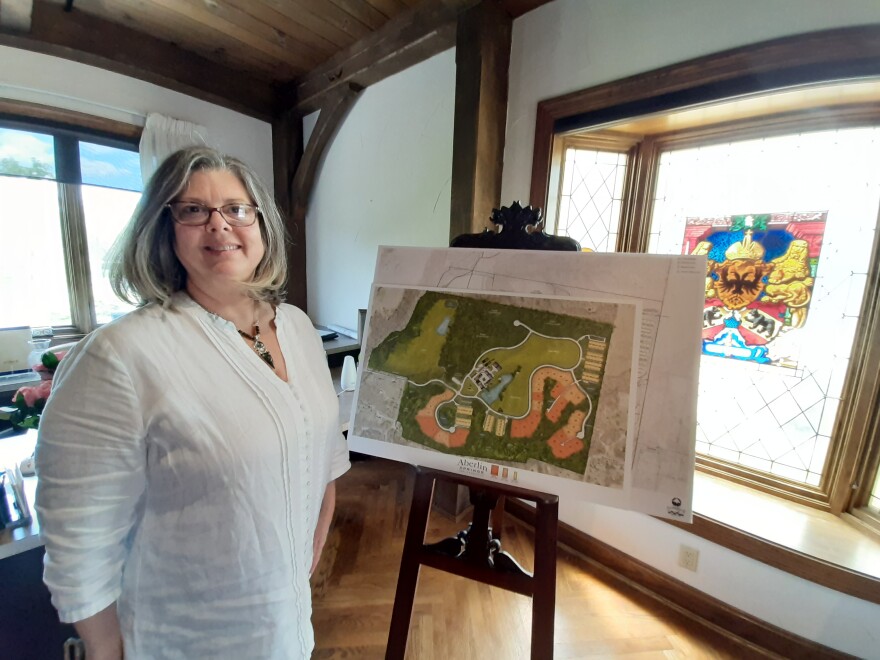Editor's note: a prior version of the web text refers to New Lebanon, which has been correct to South Lebanon.
About a decade ago, Leslie Aberlin was at a crossroads in her life. She had developed some serious health issues that were keeping her away from her company Pendragon Homes. Then her father passed away and Leslie Aberlin was left to deal with the 141 acre property he had developed for his family, which centered around a cluster of swiss-style homes.
Aberlin wanted to sell the property, but then, her father came to her in a dream.
“And he said he wasn’t going to let the farm sell,” Aberlin says."I said you’ve got to release us, you have no idea what’s going on here. I’m sick and mom can’t handle the farm all by herself. And he said, well what’s important to you?”
“I said, I think it’s organic food,” she recalls, “And he said, what do you do for a living? I said, you’re not going to believe this, but I started a home building business after you died. He said, put ‘em together."
And that advice - which came in a dream - inspired Leslie Aberlin to create a residential neighborhood built around a working farm that would supply healthy, organic food to its community.
It’s a new kind of residential development known as an Agrihood. The Urban Land Institute counts over ninety agrihoods in the U.S.. Aberlin Springs, located in the town of South Lebanon just east of Interstate 71, is the first one in Ohio.
On a beautiful spring day in May, this two year old residential development was busy. In the finished section of Phase One, modern houses lined a cul de sac. Pairs of kids pedaled their bikes down the street under a brillant blue sky dotted with puffy white clouds. Sheep grazed in a small grassy paddock alongside a donkey.
At the lake a mother and her young son were sitting on the dock eating lunch. Down the road came the faint sounds of construction crews working on the new houses in Phase Two.
Aberlin says there are homes for sale at three price points here. “So we have our courtyard product, our manor product, and our estate product,” she says, gesturing to a map of the community. “So the houses range from $350,000 to over a million. So a big spread.”

At the center of the neighborhood is the farm. Amberlin Springs employees full-time farmers to raise meat, eggs and produce on the property for the residents. The harvested food is made available through the onsite farm market. They use the Community Supported Agriculture, or CSA model. Which means subscribers pay up front for a year’s worth of products. Residents are required to pay a yearly fee of $850, which is credited to their CSA account. But unlike traditional CSA’s, the residents of Aberlin Springs get to pick and choose what they want from the on site farm market.
Outside the store I run into Amanda and her two daughters. They’ve lived here for about a year.
Amanda tells me “It could not be a more perfect place to raise kids. We have three kids. And with the younger ones, it’s just kids being free range and playing everywhere.”
“We’ve had some really fantastic potlucks, where at a moment’s notice we send out a text message, and then we’ve got five families that come together and bring a dish. And we sit around the fire and the kids are playing in the woods, and adults get to hang out and have grown up time, and the kids are right there, so it’s this perfect balance of shared space.”
Her daughter Savannah chimes in, “I love cleaning out the chicken coop and collecting all the eggs, and washing them, and putting them in the egg cartons and putting them into the market.”
In one of the community garden plots, homeowner Kate Lester is planting carrots. She just retired May 1st.
“What’s not to love?” Kate says laughing. “I mean, it’s beautiful here. And I always wanted to live on a farm, but I never wanted to do the work. But the best part is that there’s every different age group here. There’s old retired people like me, there’s 28 kids, or maybe there’s 30 by now. [laughs] They move really fast so it’s hard to keep count on them. I’ve never lived in a place before where I know all my neighbors.”
That sense of connection is what drives Leslie Aberlin’s vision for this agri-community.
“What I discovered being in the home building business, especially when I was building out in kind of your traditional subdivisions, is people are lonely. They’re lonely and they are isolated.”
Aberlin continues gesturing to the community around her, “And I’ll tell you, everytime I’m ready to open a phase, I have at least 25 to 30 people on a list. They’re clamouring to get in. It’s a testimonial to how important community is to people. It’s got to be the way of the future. I think we’re having a huge wake up call right now. It’s so scary to me how much of our food goes to China and back, and all this stuff is so unnecessary. It really will become my life's mission to teach other people how to do this.”
County Lines is WYSO's series on rural life, made possible by a grant from Ohio Humanities. This story was created at the Eichelberger Center for Community Voices at WYSO.



